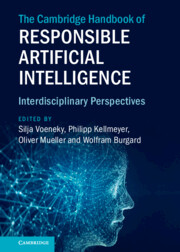Acknowledgements
We want to start by thanking the Freiburg Institute for Advanced Studies (FRIAS), University of Freiburg, for the immense support of our Saltus Responsible AI Research Group 2018–2021.Footnote * Without the FRIAS, its directors, especially Bernd Kortmann, and the team, this Handbook would not have been possible.
We would also like to thank the researchers at our Responsible AI Research Group and at the chair of Silja Voeneky, Alisa Pojtinger, Jonatan Klaedtke, and Daniel Feuerstack, who helped us edit this book, for their important work. Furthermore, we are very grateful to the research assistants Alena Huenermund (Responsible AI Research Group), Hannah Weber, and Heidi He (University of Cambridge) for their valuable support.
We would also like to acknowledge the Baden-Württemberg Stiftung for their financial support in the context of our research project AI Trust. Finally, we would like to express our thanks to the Klaus Tschira Foundation for supporting the work of editor Philipp Kellmeyer in the project “Neuroethics and AI Ethics Lab" (grant no. 00.001.2019).”
* UP 14/1 (2), DFG-ProjektID: 422010107.

